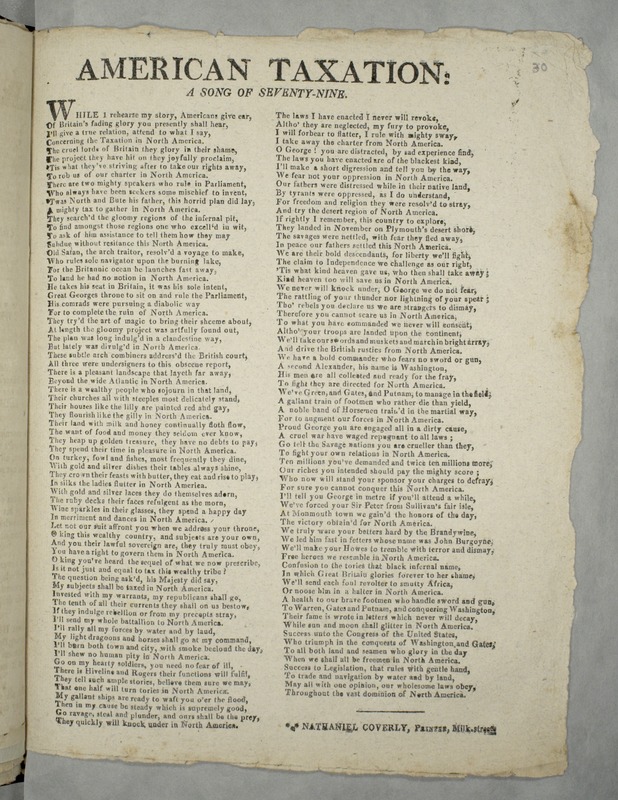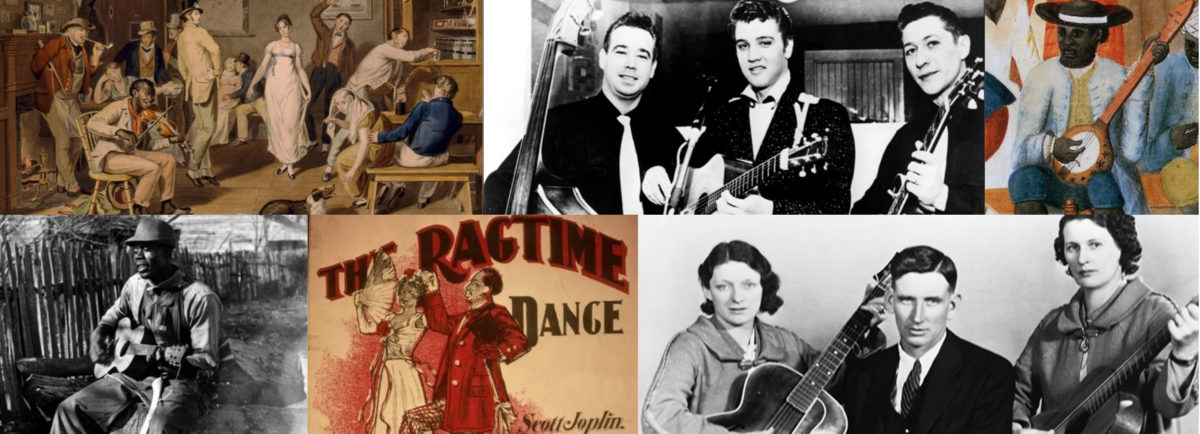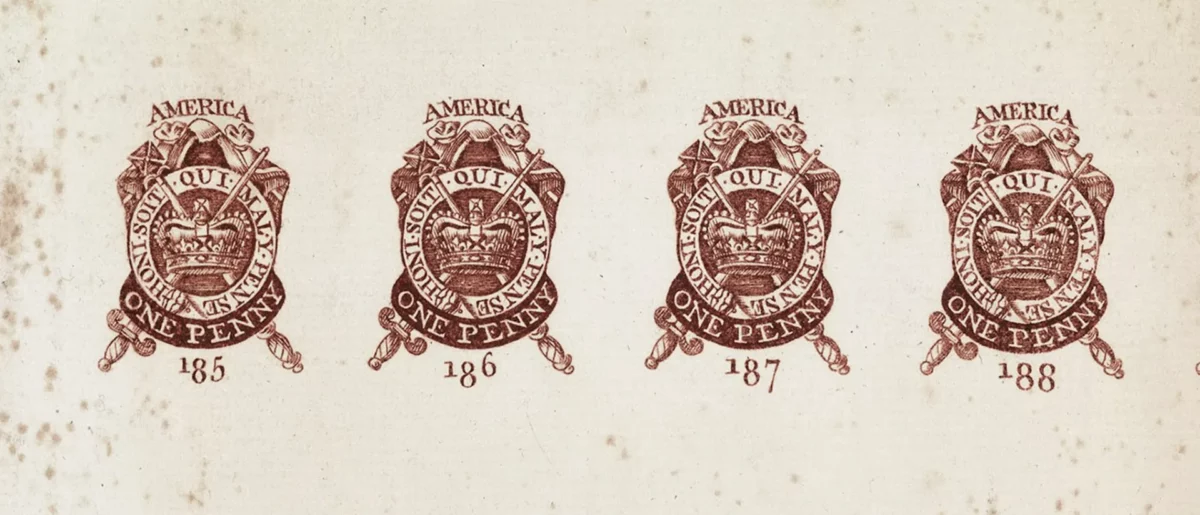Overview
"American Taxation" is a broadside ballad that originated during the early days of the American Revolution. It voices resistance to Parliament's taxation of England's colonists in North America. The earliest versions appeared just after Parliament passed the Stamp Act in 1765. Versions containing additional stanzas were published on broadsides throughout the revolutionary period and beyond. "The British Grenadiers," a traditional marching song of the English army, provides the melody.
Historical Background
England's victory against France and their Indigenous American allies during the Seven Years' War resulted in Great Britain claiming all the land in North America east of the Mississippi River (see Brave Wolfe: About the Song). Conflict between British colonists and Indigenous Americans increased as settlers pushed west into Ohio River Valley, an area established by King George III as Indian Reserve. In response, the King formed a standing army of 10,000 men in the colonies for "imperial defense."
The British government undertook several revenue-raising acts to fund the army and pay debts incurred by the war. In 1764, Parliament, prompted by The First Lord of the Treasury and Chancellor of the Exchequer Lord Grenville, enacted the Sugar Act. The act placed duties on certain imports, including sugar, coffee, wine, and other items. To reduce the smuggling of goods into the colonies, the Sugar Act also reduced the duty on foreign-made molasses and increased enforcement measures.
Again persuaded by Grenville, Parliament passed the Stamp Act in March 1765. The Stamp Act required colonists to purchase special stamped paper for printing legal documents, newspapers, licenses, pamphlets, almanacs, calendars, playing cards, and other items. The act was both a revenue-raising measure and an attempt by Parliament to assert governmental authority over the colonies. Vice-admiralty courts often tried and convicted colonists who violated the law.
Because colonists had no vote in electing Parliament, many believed that the taxes imposed by the Sugar Act and Stamp Act violated the British Constitution. "Taxation without representation is tyranny," noted Massachusetts lawyer James Otis. While colonists denounced previous taxes, opposition to the Stamp Act was much more intense. They objected because the Stamp Act imposed a direct tax on individuals which could only be paid in British currency, not colonial money. The regulations concerning the collection of these taxes were burdensome to colonial merchants, and additional costs were passed along to the consumer.
When news of the Stamp Act arrived in Virginia, the House of Burgesses, Virginia's elected Assembly, met in Williamsburg to consider their options. They passed a number of resolutions proposed by Patrick Henry, including one stating that only Virginians had the right to tax Virginians. Newspapers throughout the colonies published Henry's resolutions, and Americans united in protest against the Stamp Act. Resistance groups calling themselves the Sons of Liberty organized demonstrations. They burned and hung tax collectors in effigy and set fire to their offices. Facing threats and harassment, many stamp agents in the colonies resigned.
In October 1765, delegates from nine colonies met in New York City as the Stamp Act Congress. They issued a Declaration of Rights and Grievances stating that Parliament had no authority to impose taxes in the colonies because colonists had no vote in electing them. The separate colonies were acting and speaking as one for the first time. Merchants in several colonies boycotted goods manufactured in Britain. As a result of American resistance, Parliament repealed the Stamp Act in March 1766 before any stamps were sold.
On the same day, Parliament issued the Declaratory Act, asserting that they had the right to make laws "to bind the colonies and people of America… in all cases whatsoever." The conflicts that would lead to American independence were only beginning.
Song History
The earliest versions of "American Taxation" appeared as broadside ballads and in newspapers shortly after the passage of the Stamp Act. Between the late 18th and early 19th centuries, printer Nathaniel Coverly, Jr. issued multiple editions of the broadside from his shop on Milk Street in Boston, Massachusetts. These editions often added introductory material and stanzas while omitting earlier stanzas. An issue from 1808, with the title "Humor of 1776. American Taxation," included the following introduction:
The following is among the many national songs which were composed during the revolutionary struggle of the American Patriots, for the laudable purpose of keeping alive the spirit of resistance, and to add nerves to the despondent. The native ingenuity which characterizes the biting sarcasms contained in this production, on the unjust, oppressive, and ignominious conduct of the then British administration, has rarely, if ever, been excelled. "What a pity 'tis," as Uncle Toby would exclaim, that some bard should not, at this time, "uplift him from the lazy down," and endeavor to do like justice to the conduct of our present administration. The conduct of the British government in 1774, as nearly resembles the policy of our present rulers, as the characters of the two governments will admit. They oppressed their own subjects—our government destroys the effects of the labor of our own citizens.
The song later appeared in songsters in 1811 and 1816 and in the Forget Me Not songsters of 1835 and 1850. In 1855, American publisher and biographer Evert Augustus Duyckinck attributed the original authorship of "American Taxation" to Samuel St. John of New Canaan, Connecticut. A later claim that Peter St. John of Norwalk, Connecticut, composed the song has persisted, but no period evidence for this has been found.
"American Taxation" is commonly sung to the tune of "The British Grenadiers," a traditional marching song of the British military. While the exact origins of "The British Grenadiers" are unknown, it generally dates to the early 17th century. The tune was widely known throughout Britain and colonial America. Songsmiths of the time commonly used this melody for topical songs published as broadside ballads and in newspapers. They indicated such designations in song titles or subtitles, i.e. "A Song on Liberty, Made by a Bostonian, to the Tune of the British Grenadiers."

Lyrics
Lyrics reprinted from Songs of Independence by Irwin Silber.
While I relate my story, Americans give ear
Of Britain's fading glory, you presently shall hear
I'll give a true relation, attend to what I say
Concerning the taxation of North America
The cruel lords of Britain, who glory in their shame
The project they have hit on they joyfully proclaim
'Tis what they're striving after our rights to take away
And rob us of our charter in North America
There are two mighty speakers who rule in Parliament
Who ever have been seeking some mischief to invent
'Twas North, and Bute his father, the horrid plan did lay
A mighty tax to gather in North America
These subtle arch-combiners addressed the British court
All three were undersigners of this obscure report
There is a pleasant landscape that lieth far away
Beyond the wide Atlantic in North America
There is a wealthy people who sojourn in that land
Their churches all with steeples most delicately stand
Their houses like the gilly, are painted red and gay
They flourish like the lily in North America
Their land with milk and honey continually doth flow
The want of food or money they seldom ever know
They heap up golden treasure, they have no debts to pay
They spend their time in pleasure in North America
O King, you've heard the sequel of what we now subscribe
Is it not just and equal to tax this wealthy tribe
The question being asked, his majesty did say
My subjects shall be taxed in North America
Invested with a warrant, my publicans shall go
The tenth of all their current they surely shall bestow
If they indulge rebellion, or from my precepts stray
I'll send my war battalion to North America
I'll rally all my forces by water and by land
My light dragoons and horses shall go at my command
I'll burn both town and city, with smoke becloud the day
I'll show no human pity for North America
My gallant ships are ready to waft you o'er the flood
And in my cause be steady, which is supremely good
Go ravage, steal and plunder, and you shall have the prey
They quickly will knock under in North America
The laws I have enacted, I never will revoke
Although they are neglected my fury to provoke
I will forbear to flatter, I'll rule the mighty sway
I'll take away the charter from North America
O George! you are distracted, you'll by experience find
The laws you have enacted are of the blackest kind
I'll make a short digression, and tell you by the way
We fear not your oppression in North America
Our fathers were distressed, while in their native land
By tyrants were oppressed, as we do understand
For freedom and religion they were resolved to stray
And trace the desert regions of North America
We are their bold descendants, for liberty we'll fight
The claim to independence we challenge as our right
'Tis what kind Heaven gave us, who can it take away
O, Heaven, sure will save us in North America
Sing It Yourself Videos and Recordings
The Karaoke Version and Lyric Video contain select stanzas from the lyrics above.
Download or stream recordings from Bandcamp:
Lead Sheet
Download and print lead sheets that include lyrics, chords, and melody. Click the play button to listen. Click the track title to download it free from Bandcamp. The lead sheet contains select stanzas from the lyrics above.


